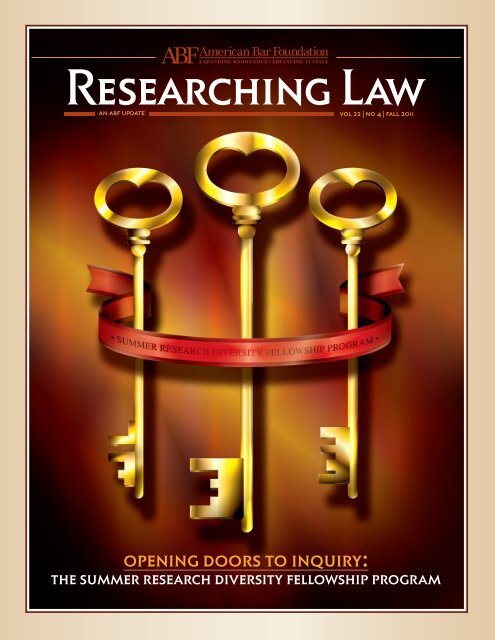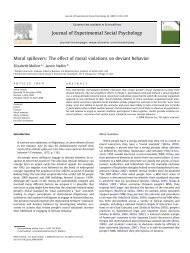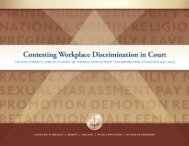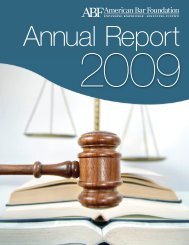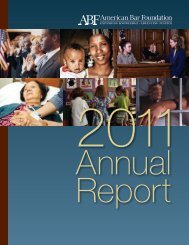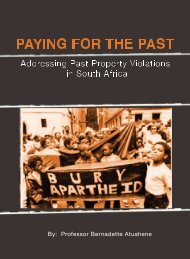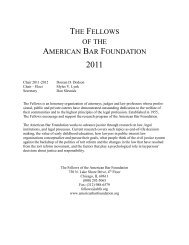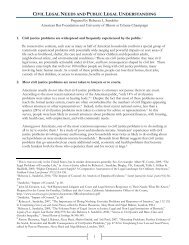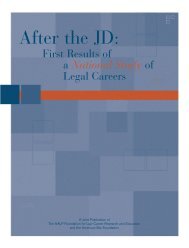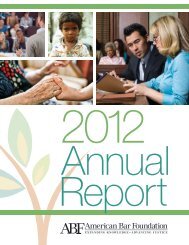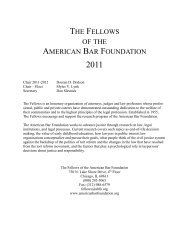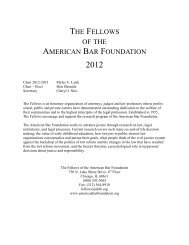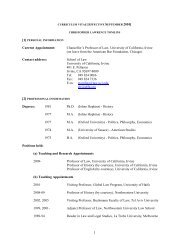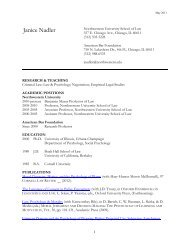opening doors to inquiry: - American Bar Foundation
opening doors to inquiry: - American Bar Foundation
opening doors to inquiry: - American Bar Foundation
Create successful ePaper yourself
Turn your PDF publications into a flip-book with our unique Google optimized e-Paper software.
vol 22 | no 4 | fall 2011<br />
<strong>opening</strong> <strong>doors</strong> <strong>to</strong> <strong>inquiry</strong>:<br />
the summer research diversity fellowship program
<strong>opening</strong> <strong>doors</strong> <strong>to</strong> <strong>inquiry</strong><br />
Opening Doors <strong>to</strong> Inquiry :<br />
The Summer Research<br />
Diversity Fellowship Program<br />
“Meeting and interacting with students from different backgrounds and<br />
different universities was broadening; talking <strong>to</strong> my peers about their<br />
interests and plans was very affirming.<br />
And working with my faculty<br />
men<strong>to</strong>r and being so closely<br />
involved in the research process<br />
helped me <strong>to</strong> better appreciate<br />
all that went in<strong>to</strong> the final research<br />
product,” recalls Erika George, who<br />
spent eight weeks at the <strong>American</strong><br />
<strong>Bar</strong> <strong>Foundation</strong> in 1991 as an undergraduate<br />
Summer Research Diversity<br />
Fellow. Then only in its fourth year,<br />
the Summer Research Diversity Fellowship<br />
(SRDF) Program was initiated<br />
in 1988 by the ABF as way <strong>to</strong> help<br />
broaden the participation of minority<br />
students in empirical legal scholarship<br />
and <strong>to</strong> encourage them <strong>to</strong> pursue careers<br />
in that area. Like the almost one<br />
hundred Fellows in the years since,<br />
George was an accomplished, energetic,<br />
and inquisitive undergraduate<br />
with an interest in law and society,<br />
1 researching law<br />
who found an encouraging and intellectually<br />
stimulating environment<br />
at the ABF. Now a Professor of Law<br />
at the S.J. Quinney College of Law<br />
at the University of Utah, George<br />
identifies her intellectual “home” as<br />
the “Law and Society” community,<br />
which, at its core, is about another<br />
kind of diversity—that of bringing a<br />
variety of intellectual perspectives <strong>to</strong><br />
bear on the study of law.<br />
The summer of 2011 marked the<br />
24th annual session of the program,<br />
which aims <strong>to</strong> give undergraduate students<br />
an in-depth introduction <strong>to</strong> the<br />
rewards and demands of a researchoriented<br />
career in the field of law<br />
and social science. Admission <strong>to</strong> the<br />
program is highly competitive; four<br />
students, out of hundreds who apply<br />
from colleges and universities across<br />
the country, are invited <strong>to</strong> come <strong>to</strong><br />
the ABF for the summer. Each student<br />
is assigned <strong>to</strong> an ABF Research<br />
Professor who involves the student in<br />
the design and implementation of the<br />
Professor’s research project and who<br />
acts as men<strong>to</strong>r during the student’s<br />
tenure. While the students work primarily<br />
as research assistants, they also<br />
attend a series of seminars conducted<br />
by ABF Research Professors who acquaint<br />
the students with their diverse<br />
research projects.<br />
In addition <strong>to</strong> their ABF research<br />
involvement, the students are exposed<br />
<strong>to</strong> various legal career options<br />
and observe the justice system in action<br />
in the city of Chicago. A series<br />
of field trips provides the students<br />
with an opportunity <strong>to</strong> talk with legal<br />
ac<strong>to</strong>rs in the real-world environments<br />
vol 22 | no4 | fall 2011
<strong>opening</strong> <strong>doors</strong> <strong>to</strong> <strong>inquiry</strong><br />
The 2011 Summer Research Diversity Fellows: Left <strong>to</strong> right: Alvita Akiboh, Arlene Rivera, Wintre Foxworth, Chris Han<br />
that are the focus of the ABF’s empirical<br />
research. In past years the students<br />
have visited, among others, the<br />
offices of Cook County’s Public Defender,<br />
Public Guardian, and State’s<br />
At<strong>to</strong>rney, the Illinois Solici<strong>to</strong>r General,<br />
the juvenile and criminal courts,<br />
and have met with individual private<br />
practitioners and judges.<br />
2011 summer research<br />
diversity fellows<br />
Alvita Akiboh, a native of Indianapolis,<br />
Indiana, is a rising senior<br />
at Indiana University at Blooming<strong>to</strong>n.<br />
She is pursuing a B.A. in<br />
His<strong>to</strong>ry with minors in Economics,<br />
Political Science, and Spanish. She is<br />
particularly interested in the his<strong>to</strong>ry<br />
of United States foreign relations.<br />
Alvita is a member of the Hudson<br />
Holland Honors Program, a program<br />
that promotes academic excellence<br />
as well as community service in<br />
minority undergraduate students.<br />
She is also a member of the Hut<strong>to</strong>n<br />
Honors College and a Herbert Presidential<br />
Scholar at Indiana University.<br />
Alvita is involved in honors societies<br />
outside of IU as well, such as the<br />
National Society of Collegiate Scholars<br />
and the Alpha Lambda Delta and<br />
Phi Eta Sigma Honors Societies. For<br />
her continued academic excellence,<br />
she has been named a Founders<br />
Scholar every year thus far during her<br />
undergraduate study. After graduation,<br />
she plans <strong>to</strong> pursue a Ph.D.<br />
in His<strong>to</strong>ry. Alvita gained research<br />
experience working with Direc<strong>to</strong>r and<br />
Research Professor Robert L. Nelson<br />
on the After the JD project.<br />
Wintre Foxworth, a native of<br />
Chesapeake, Virginia, is a rising senior<br />
at the University of Virginia in<br />
Charlottesville who is majoring in<br />
Government and African-<strong>American</strong><br />
and African Studies, with a minor<br />
in Sociology. Various fields of law<br />
intrigue her, but she is particularly<br />
interested in criminal law and the<br />
political and social consequences of<br />
disenfranchisement. At the University,<br />
she is an Echols Scholar, an<br />
honor only given <strong>to</strong> a select group<br />
of students in the College of Arts<br />
and Sciences, and a Ridley Scholar,<br />
a scholarship given <strong>to</strong> African-<strong>American</strong><br />
students of the highest academic<br />
caliber. Upon graduation, Wintre will<br />
attend law school and explore the<br />
vol 22 | no 4 | fall 2011 researching law 2
<strong>opening</strong> <strong>doors</strong> <strong>to</strong> <strong>inquiry</strong><br />
multitude of paths within the legal<br />
field. Wintre worked with Research<br />
Professor Dylan Penningroth this<br />
summer examining the engagement<br />
of African-<strong>American</strong>s in the civil<br />
court system, ranging from the Civil<br />
War through the Great Migration.<br />
Chris Han, a native of Castro Valley,<br />
California, is a rising junior at the<br />
University of California, Berkeley. He<br />
is majoring in Political Science with<br />
a focus in International Relations.<br />
He is interested in ways that the legal<br />
system reflects such processes and<br />
institutions as poverty and religion,<br />
in particular, the quality of legal services<br />
provided <strong>to</strong> the poor and the<br />
influence of religious lobby groups<br />
on interpretations of the Constitution.<br />
Chris has interned at the San<br />
Francisco District At<strong>to</strong>rney’s office,<br />
where he was a liaison between victims<br />
of crime and Assistant District<br />
At<strong>to</strong>rneys, and has engaged in crisis<br />
intervention for victims of domestic<br />
violence and robbery. Following<br />
graduation, Chris plans <strong>to</strong> go <strong>to</strong> law<br />
school, after which he hopes <strong>to</strong> work<br />
at a lobbying firm or the Department<br />
of Justice. Chris worked with<br />
Faculty Fellow Chris<strong>to</strong>pher Schmidt<br />
this summer on Schmidt’s research<br />
project “Creating Brown v. Board of<br />
Education: Ideology and Constitutional<br />
Change, 1945-1955.”<br />
3 researching law<br />
ing in Psychology and Crime, Law,<br />
and Justice. Arlene, who hails from<br />
Palmet<strong>to</strong> Bay, Florida, is a member<br />
of the Schreyer Honors College, and<br />
is a Paterno Fellow—an honors program<br />
within the College of Liberal<br />
Arts. At Penn State Arlene is a research<br />
assistant for a study exploring<br />
defendant disparities in Pennsylvania<br />
death penalty cases, and another<br />
study evaluating the local DUI court.<br />
Arlene also assists with research at<br />
Penn State’s Labora<strong>to</strong>ry for Personality,<br />
Psychopathology, and Psychotherapy<br />
Research. After graduation, Arlene<br />
plans <strong>to</strong> attend law school and focus<br />
on international law. Arlene worked<br />
with Research Professor John Hagan<br />
this summer on his research on crime<br />
in pre- and post-invasion Iraq.<br />
an in-depth look at<br />
the undergraduate<br />
experience at the abf<br />
Researching Law edi<strong>to</strong>r Katharine<br />
W. Hannaford sat down with ABF<br />
Research Professor Stephen Daniels,<br />
who has been directing the academic<br />
component of the program.<br />
KWH: Steve, what is unique about<br />
the Summer Research Diversity Fellowship<br />
Program at the ABF?<br />
SD: The program brings bright,<br />
motivated undergraduates from diverse<br />
backgrounds <strong>to</strong>gether for eight<br />
weeks and provides them the chance<br />
<strong>to</strong> do real research with an experienced<br />
researcher. It’s an opportunity <strong>to</strong> not<br />
Arlene Rivera is a rising senior at<br />
the Pennsylvania State University in<br />
University Park, PA, double majoronly<br />
experience the nuts and bolts<br />
of research, but also <strong>to</strong> observe and<br />
understand the thinking that goes<br />
in<strong>to</strong> a project, and <strong>to</strong> see how the<br />
process unfolds.<br />
KWH: What was your role in the<br />
program this summer?<br />
SD: The students learn how <strong>to</strong> do research<br />
by working closely with their<br />
faculty men<strong>to</strong>r. Usually, the experience<br />
hooks them; in short order they<br />
“dig in.” I augment this experience<br />
by organizing the informal faculty<br />
seminars where other ABF researchers<br />
speak <strong>to</strong> the students about the<br />
questions that interest them, about<br />
what motivated them; how they got<br />
interested. I aim <strong>to</strong> make sure the<br />
students are exposed <strong>to</strong> as wide as<br />
possible a range of the work that is<br />
done at the ABF. In addition, non-<br />
ABF researchers, others involved<br />
in the legal system in Chicago, and<br />
SRDF alumni come <strong>to</strong> the ABF <strong>to</strong><br />
talk with the students. It’s important<br />
for the students <strong>to</strong> see that there is<br />
no set way <strong>to</strong> come up with interesting<br />
questions. Undergraduates aren’t<br />
usually exposed <strong>to</strong> these insights in<strong>to</strong><br />
the process of research.<br />
KWH: And the students have their<br />
own seminar as well?<br />
SD: Yes, I put <strong>to</strong>gether readings for<br />
the students with the same aim of<br />
showing them the broad range of<br />
possibilities for research. Readings<br />
can range from a scholarly Law and<br />
Society Review article <strong>to</strong> a New Yorker<br />
article on, say, healthcare policy.<br />
vol 22 | no4 | fall 2011
<strong>opening</strong> <strong>doors</strong> <strong>to</strong> <strong>inquiry</strong><br />
The students read and discuss these<br />
articles not so much for their content<br />
as for their framing of questions<br />
and ways of getting answers. We<br />
don’t focus so much on reading legal<br />
cases; when we do read cases, we always<br />
add empirical data <strong>to</strong> the mix.<br />
The seminar can be adapted <strong>to</strong> students’<br />
interests; it is quite flexible.<br />
There is no set syllabus, but there is a<br />
set of broad goals.<br />
KWH: The program is not purely<br />
academic, though. Can you tell me<br />
more about some of the other experiences<br />
the students have?<br />
SD: The program incorporates three<br />
main elements: the academic perspective,<br />
which we’ve just discussed,<br />
the practice perspective, and direct<br />
experience. To get a sense of the<br />
varieties of legal practice the students<br />
visit Chicago law firms and other<br />
practice settings. For many summers<br />
ABF Life Fellow Graham Grady, a<br />
partner at the Chicago office of K &<br />
L Gates, has graciously hosted them<br />
at his firm. In addition, this summer<br />
the students visited and talked with<br />
at<strong>to</strong>rneys at the Criminal Law Clinic<br />
at Chicago-Kent College of Law.<br />
Dan Coyne, clinical law professor at<br />
Chicago-Kent and an ABF Fellow,<br />
gave a presentation. From this visit<br />
they learned about the law student<br />
experience of clinics and also about<br />
criminal defense work in general.<br />
Every summer the students have the<br />
direct experience of visiting Chicago’s<br />
criminal court building on the city’s<br />
west side at 26th Street and California<br />
Avenue, part of one of the largest<br />
unified court systems in the world.<br />
At 26th and California they have a<br />
<strong>to</strong>ur and meet with a judge and<br />
observe a trial. These are just a few<br />
examples of the kinds of experiences<br />
the students have. The three<br />
elements—academic, practice, and<br />
direct experience—<strong>to</strong>gether make for<br />
a very rich learning experience.<br />
ABF Research Professor Stephen Daniels<br />
KWH: What role does ABF’s location<br />
in the city of Chicago play in the<br />
program?<br />
SD: A program like this will only<br />
work in a large, diverse city. There<br />
is a great array of activity in the legal<br />
realm in Chicago every day. I<br />
tell the students “look out the back<br />
door” and see what’s around, take<br />
full advantage of the urban setting<br />
in which they find themselves. The<br />
students work hard, but they are not<br />
graded; the program is not about performance,<br />
it is about experience and<br />
exposure. There’s no question about<br />
these students’ academic abilities<br />
—we’ve selected the best, and they<br />
take full advantage of what we offer.<br />
They’ve earned this opportunity<br />
<strong>to</strong> learn in a grade-free environment.<br />
In their time off the students are free<br />
<strong>to</strong> explore any aspect of the city that<br />
interests them from politics <strong>to</strong> sports<br />
<strong>to</strong> theater <strong>to</strong> the built environment.<br />
Every year they take full advantage of<br />
the urban setting.<br />
KWH: Is there anything else you’d<br />
like our readers <strong>to</strong> know about the<br />
Summer Research Diversity Fellowship<br />
program?<br />
SD: Though research forms the<br />
core of the program, not all program<br />
alumni will go on <strong>to</strong> become<br />
academics. At the most general level,<br />
the program is about affecting future<br />
leaders in some area of the law. Much<br />
of the research that’s being done at<br />
the ABF is about exploring how we<br />
think about issues of diversity and<br />
equality and the law, and we want <strong>to</strong><br />
expose the students <strong>to</strong> different ways<br />
of addressing these questions. If we<br />
can have an impact at the most general<br />
level on how these students think<br />
about the law, that’s important.<br />
in support of<br />
the program<br />
In 2011 the Summer Research Diversity<br />
Program has been supported by<br />
generous donations from:<br />
Seyfarth Shaw LLP<br />
The Lloyd A. Fry <strong>Foundation</strong><br />
The National Science <strong>Foundation</strong><br />
vol 22 | no 4 | fall 2011 researching law 4
<strong>opening</strong> <strong>doors</strong> <strong>to</strong> <strong>inquiry</strong><br />
In Memoriam<br />
Harle Garth Montgomery<br />
Harle Garth Montgomery, a major benefac<strong>to</strong>r of the Summer Research Diversity Fellowship program,<br />
passed away on Oc<strong>to</strong>ber 24, 2010 at the age of 92 at her home in La Jolla, California. Born in Beaumont,<br />
Texas she grew up in La Jolla, attending public school there. After attending Stanford University, she<br />
worked as a journalist in the United States, Europe, the Middle East, and Asia, interviewing figures such<br />
as King Hussein, John F. Kennedy and Richard Nixon. After marrying her second husband, Kenneth F.<br />
Montgomery, a Chicago lawyer, she dedicated herself <strong>to</strong> charitable causes in the areas of social justice,<br />
education, politics, and the arts. In 1993, she and her husband established the Chicago-based Kenneth<br />
and Harle Montgomery <strong>Foundation</strong> <strong>to</strong> support charitable causes in these areas. Mrs. Montgomery was<br />
also active in Democratic national politics, campaigning for Adlai Stevenson, Jimmy Carter, and <strong>Bar</strong>ack<br />
Obama, among many others.<br />
In 1999 and 2000 the Montgomery <strong>Foundation</strong> contributed a <strong>to</strong>tal of $100,000 <strong>to</strong> the Summer<br />
Research Diversity Fellowship Program.<br />
In addition <strong>to</strong> the <strong>Bar</strong> <strong>Foundation</strong>’s Summer Research Diversity Fellowship Program, the Montgomery<br />
<strong>Foundation</strong> supports the Kenneth and Harle Montgomery Professorship in Public Interest Law at<br />
Stanford Law School, the Thomas F. Geraghty Fund for Juvenile Justice at Northwestern University School<br />
of Law, and the Montgomery House at Dartmouth College, a residential base for visiting scholars.<br />
Her nephew, Bryant Garth, directed the ABF from 1990 <strong>to</strong> 2004. According <strong>to</strong> him, “Harle wanted<br />
<strong>to</strong> do something <strong>to</strong> help the <strong>Foundation</strong>, and it was clear that the Summer Research Diversity Fellowship<br />
was the program that perfectly fit her commitment <strong>to</strong> equal opportunity and education. She was very<br />
pleased with the achievements of this program.”<br />
5 researching law<br />
vol 22 | no4 | fall 2011
<strong>opening</strong> <strong>doors</strong> <strong>to</strong> <strong>inquiry</strong><br />
The Summer Research<br />
Diversity Fellows<br />
Alumni<br />
Since its inception in 1988<br />
the program has hosted 98<br />
undergraduates (71 women,<br />
27 men) from 55 colleges and universities,<br />
who hail from 29 states as<br />
well as Puer<strong>to</strong> Rico, Hong Kong and<br />
Papua New Guinea. Of the 98 students<br />
who have participated in the<br />
program, about 53 percent identified<br />
themselves as African <strong>American</strong>,<br />
19.4 percent Hispanic/Latino, 19.4<br />
percent Asian, South Asian, biracial,<br />
or other, 7.15 percent Puer<strong>to</strong> Rican,<br />
and one person identified herself as<br />
Native <strong>American</strong>.<br />
While many Summer Research<br />
Diversity Fellowship alumni go on <strong>to</strong><br />
academic careers in the social sciences<br />
and law, many others have chosen<br />
<strong>to</strong> pursue careers as legal practitioners,<br />
<strong>to</strong> work in government, social<br />
policy, or business. Of the 86 alumni<br />
through 2008, ABF has been able <strong>to</strong><br />
identify the work or study areas of 71.<br />
Of the 71, 18 percent were working<br />
in law firms, 13 percent had careers<br />
in academia, mostly in law, 13 percent<br />
were currently graduate students,<br />
mostly in JD, joint JD/PhD or JD/<br />
MA programs, 30 percent were using<br />
their legal skills in business settings, 8<br />
percent were working in government,<br />
7 percent were working in the policy<br />
arena, 3 percent were working in the<br />
non-governmental non-profit sec<strong>to</strong>r<br />
and 3 percent were working in health<br />
care or health care policy.<br />
alumni profile:<br />
erika george<br />
(SRDF 1991), Professor, S.J. Quinney<br />
College Of Law, University Of Utah<br />
Erika George, then a rising senior<br />
majoring in Politics, Economics,<br />
Rhe<strong>to</strong>ric & Law at the University of<br />
Chicago, spent the summer of 1991<br />
at the <strong>Bar</strong> <strong>Foundation</strong> as a Summer<br />
Research Diversity Fellow. Now a<br />
Professor of Law at the S. J. Quinney<br />
College of Law, University of<br />
Utah, George studies the intersection<br />
of globalization and human rights,<br />
addressing issues such as gender<br />
violence and gender equality, socioeconomic<br />
rights, cultural pluralism<br />
and environmental justice. Her current<br />
research focuses on the responsibility<br />
of multinational corporations<br />
<strong>to</strong> respect international human rights,<br />
and movements <strong>to</strong> hold corporations<br />
accountable for the influence of their<br />
practices on human rights.<br />
Professor George is currently at<br />
work on a book, Incorporating Rights:<br />
Human Rights, Corporate Responsibility<br />
and Conscious Community, which,<br />
she says, “will evaluate the potential<br />
of global industry’s efforts <strong>to</strong> fill an<br />
existing regula<strong>to</strong>ry void concerning<br />
corporate responsibility <strong>to</strong> respect<br />
human rights with voluntary codes<br />
of conduct.” Using three different<br />
case studies from three different<br />
regions as illustrations, George will<br />
argue that “shifting demands of a<br />
select citizen consumer community<br />
can drive corporations <strong>to</strong> change the<br />
way in which they conduct business<br />
<strong>to</strong> better align with respect for human<br />
rights and reasonable environmen-<br />
vol 22 | no 4 | fall 2011 researching law 6
<strong>opening</strong> <strong>doors</strong> <strong>to</strong> <strong>inquiry</strong><br />
tal use.” In addition <strong>to</strong> her research,<br />
Professor George teaches courses in<br />
Constitutional Law, Civil Procedure,<br />
International Human Rights and<br />
International Environmental Law.<br />
George, a native of Chicago<br />
Heights, Illinois, received her J.D.<br />
from Harvard Law School as well as a<br />
Master’s degree in International Relations<br />
from the University of Chicago.<br />
Before joining the University of Utah<br />
law faculty in 2003, she clerked for<br />
Judge William T. Hart of the United<br />
States District Court for the Northern<br />
District of Illinois, worked as a litigation<br />
associate, and as a consultant<br />
<strong>to</strong> Human Rights Watch. Currently,<br />
she serves as special counsel <strong>to</strong> the<br />
Women’s Rights Division of Human<br />
Rights Watch. Among other roles,<br />
George also serves on the Executive<br />
Committee of the U.S. Department<br />
of State Public-Private Partnership<br />
for Justice Reform in Afghanistan.<br />
She has published in the California<br />
Law Review, the Michigan Journal of<br />
International Law, and the annual<br />
proceedings of the <strong>American</strong> Society<br />
of International Law. In 2008, George<br />
received the S. J. Quinney College of<br />
Law’s Early Career Award.<br />
This past summer Erika George<br />
was in residence at the <strong>Bar</strong> <strong>Foundation</strong><br />
as a Visiting Scholar, and will<br />
visit in future summers on an ongoing<br />
basis. In addition <strong>to</strong> working on<br />
her research this summer, Professor<br />
George shared a brownbag lunch with<br />
the undergraduate Fellows, “where<br />
I talked a little about my work and<br />
7 researching law<br />
listened <strong>to</strong> what was on their minds,”<br />
she states. According <strong>to</strong> George, “it<br />
was very interesting seeing them at<br />
the stage they’re at, hearing about<br />
their plans, as well as their uncertainties.<br />
It was beneficial and energizing<br />
Professor Erika George<br />
© All rights reserved, University of Utah,<br />
S.J. Quinney College of Law<br />
<strong>to</strong> me <strong>to</strong> see how eager and excited<br />
and curious they were, how they were<br />
in a space of exploration. It is OK <strong>to</strong> be<br />
uncertain, as uncertainty will get them<br />
<strong>to</strong> ask questions. To a person, they all<br />
want <strong>to</strong> make an impact; the ability<br />
<strong>to</strong> ask and frame questions will help<br />
them <strong>to</strong> do that wherever they go.”<br />
When asked about the progress<br />
of diversity in the legal academy and<br />
legal profession in general, George<br />
shares that she sees room for improvement.<br />
“There are costs and consequences<br />
for not having a diversity of<br />
perspectives that have a long lasting<br />
impact on the profession,” George<br />
comments. “What we need now are<br />
people who are informed and conscientious<br />
about difference and inclusion<br />
and exclusion, and about how<br />
law and policy can help <strong>to</strong> elevate<br />
people or can continue <strong>to</strong> exacerbate<br />
existing inequalities,” she adds.<br />
George notes that, by nature,<br />
we tend <strong>to</strong> connect <strong>to</strong> those who are<br />
quite similar <strong>to</strong> us, who share similar<br />
backgrounds, values and perspectives.<br />
“And connections, of course, are crucial<br />
<strong>to</strong> professional development,”<br />
says George. “It’s not going <strong>to</strong> happen<br />
by accident; it is not random.<br />
Because people have a natural tendency<br />
<strong>to</strong> tap in<strong>to</strong> the social and professional<br />
networks of others who are like<br />
themselves, <strong>to</strong> move <strong>to</strong>wards greater<br />
diversity you have <strong>to</strong> make an active<br />
effort <strong>to</strong> be inclusive.”<br />
As George concludes, “In an era<br />
of increasing economic inequality,<br />
we need a kind of ‘affirmative action<br />
for access.’ It is important <strong>to</strong> invite<br />
diverse people in<strong>to</strong> the social networks<br />
of scholars and legal professionals.<br />
The ABF’s SRDF program is<br />
one potential avenue <strong>to</strong> help improve<br />
the situation at the very beginning of<br />
young peoples’ professional development.<br />
The SRDF program creates<br />
“access” <strong>to</strong> the scholars and ongoing<br />
activities at the <strong>Bar</strong> <strong>Foundation</strong> in a<br />
way that opens up possibilities for the<br />
summer fellows.”<br />
vol 22 | no4 | fall 2011
<strong>opening</strong> <strong>doors</strong> <strong>to</strong> <strong>inquiry</strong><br />
Program Alumni<br />
and their Undergraduate Institutions<br />
1988 ~ 2010<br />
1988<br />
Andrea Lynn Caver<br />
Northwestern University<br />
Calita LaTanya Els<strong>to</strong>n<br />
Northwestern University<br />
James Scott McKee<br />
Northwestern University<br />
David P. White<br />
Grinnell College<br />
1989<br />
George Comer<br />
University of Chicago<br />
Kim McCullough<br />
Trinity College<br />
Deborah S. Skolnik<br />
Wesleyan University<br />
Lisa Ann Stewart<br />
Yale University<br />
1990<br />
Ot<strong>to</strong> Beatty, III<br />
Morehouse College<br />
Theresa M. Cerda<br />
Northwestern University<br />
Karen Kathleen Harris<br />
Prince<strong>to</strong>n University<br />
Vic<strong>to</strong>r Andres Reinoso<br />
George<strong>to</strong>wn University<br />
1991<br />
Julie M. Bernstein<br />
Northwestern University<br />
Erika Renee George<br />
University of Chicago<br />
James Gleason Hurt<br />
Bowdoin College<br />
Akilah E. Kamaria<br />
Penn State University<br />
1992<br />
Mario-Florentino Cuéllar<br />
Harvard University<br />
Tiffany Rae Davis<br />
Northwestern University<br />
Gabriella C. Gonzalez<br />
Harvard University<br />
Lori C. Thomas<br />
Penn State University<br />
1993<br />
Christine Marie Garza<br />
Northeastern Illinois University<br />
Sherri Jennifer Lee<br />
Spelman College<br />
Rhonda Joy Mundhenk<br />
Westmont College<br />
Trevor Howard Peterson<br />
Northwestern University<br />
Tom Isaac Romero<br />
University of Denver<br />
vol 22 | no 4 | fall 2011 researching law 8
<strong>opening</strong> <strong>doors</strong> <strong>to</strong> <strong>inquiry</strong><br />
1994<br />
Martha P. Escobedo<br />
California Polytechnic University<br />
Hosea H. Harvey<br />
Dartmouth College<br />
Corinna B. Polk<br />
University of Southern California<br />
Melanie E. Roberson<br />
Wesleyan University<br />
1995<br />
Daniel J. Acosta<br />
Yale University<br />
Rafael Cox-Alomar<br />
Cornell University<br />
Danielle R. Holley<br />
Yale University<br />
Zenita A. Wickham<br />
University of Maryland<br />
Jeannette Wise<br />
Wittenberg University<br />
1996<br />
Vanessa Corea<br />
Cornell University<br />
Gilber<strong>to</strong> Garay<br />
Harvard University<br />
Llezlie L. Green<br />
Dartmouth College<br />
Hae Jin Lee<br />
Pomona College<br />
1997<br />
Liany E. Arroyo<br />
Wellesley College<br />
An<strong>to</strong>nio José Martínez<br />
Amherst College<br />
Natalie Stites<br />
University of California, Los Angeles<br />
Natausha A. Wilson<br />
Stanford University<br />
1998<br />
Jamie Allyn Anderson<br />
University of Chicago<br />
Terrica LaShun Redfield<br />
Tougaloo College<br />
Van Therese Tang<br />
Yale University<br />
Gene K. Yoshida<br />
Swarthmore College<br />
1999<br />
Srivitta Kengskool<br />
University of Michigan<br />
Bonita Yen Hua Leung<br />
Carle<strong>to</strong>n College<br />
Benjamin I. Longoria<br />
Stanford University<br />
Pedro Reyes<br />
University of Notre Dame<br />
2000<br />
Ryan C. Green<br />
Emory University<br />
Vi Doan Nguyen<br />
University of Virginia<br />
Sheetal M. Parikh<br />
University of Chicago<br />
LaKesha L. Threats<br />
University of Memphis<br />
2001<br />
Sachin M. Shivaram<br />
Harvard University<br />
Rocio C. Garcia<br />
Mount Holyoke College<br />
Jillian J. Harrigan<br />
LaSalle University<br />
Julie Hsiang-chi Liu<br />
University of Virginia<br />
2002<br />
Maya E. F. Brown<br />
Emory University<br />
Lauren T. Manalang<br />
University of California, Los Angeles<br />
Hafeeza E. Rashed<br />
Spelman College<br />
Selena R. Sanderfur<br />
Fisk University<br />
9 researching law<br />
vol 22 | no4 | fall 2011
<strong>opening</strong> <strong>doors</strong> <strong>to</strong> <strong>inquiry</strong><br />
2003<br />
Tsedey A. Bogale<br />
Spelman College<br />
Samuel G. Prie<strong>to</strong><br />
Whittier College<br />
Krystal S. Reyes<br />
New York University<br />
Lindell Carl Toombs, Jr.<br />
Hamp<strong>to</strong>n University<br />
2004<br />
Sarah Ann Bass<br />
Amherst College<br />
Gray I. Mateo<br />
University of Illinois<br />
Helen O. Ogbara<br />
Harvard University<br />
Destiny Peery<br />
University of Minnesota<br />
2005<br />
Cassandra B. Fields<br />
University of Chicago<br />
William G. Godwin<br />
George<strong>to</strong>wn University<br />
Lakeisha Gulley<br />
Dillard University<br />
Carla Laroche<br />
Prince<strong>to</strong>n University<br />
2006<br />
Zeh-Sheena Ekono<br />
Harvard University<br />
Deepa Thimmapya<br />
Northwestern University<br />
Tiffanye S. Threadcraft<br />
Harvard University<br />
Danielle Toal<strong>to</strong>an<br />
Swarthmore College<br />
2007<br />
Temi Adeniji<br />
Prince<strong>to</strong>n University<br />
Nadia Nazim Aziz<br />
Clemson University<br />
Erika P. Lopez<br />
University of Wisconsin<br />
Brionni A. McGriff<br />
Iowa State University<br />
2008<br />
Marcus W. Allen<br />
<strong>American</strong> University<br />
Francesca A. Gibson<br />
Spelman College<br />
Akta S. Jantrania<br />
Claremont McKenna College<br />
Anayansi Rodriguez<br />
Duke University<br />
2009<br />
Gabriela Jara<br />
Columbia University<br />
Alana C. Kirkland<br />
Stanford University<br />
Cara L. McClellan<br />
Yale University<br />
Amin M. Montgomery<br />
University of Washing<strong>to</strong>n, Seattle<br />
2010<br />
Angela Esi Addae<br />
Fisk University<br />
Joseph L. Bishop<br />
Clemson University<br />
Stephanie M. Caro<br />
Stanford University<br />
Eduardo-An<strong>to</strong>nio Navarro<br />
University of Iowa<br />
More information on the Summer Research<br />
Diversity Fellowship Program<br />
may be found on ABF’s website at:<br />
http://www.americanbarfoundation.<br />
org/fellowships/call_for_summer_<br />
research_diversity_fellows.html<br />
If you are interested in supporting<br />
the Summer Research Diversity<br />
Fellowship Program or other important<br />
ABF initiatives, please contact<br />
Lucinda Underwood at 312.988.6573<br />
vol 22 | no 4 | fall 2011 researching law 10
president<br />
William C. Hubbard<br />
direc<strong>to</strong>r<br />
Robert L. Nelson<br />
writer | edi<strong>to</strong>r<br />
Katharine W. Hannaford<br />
researching law<br />
An ABF Update<br />
Quarterly Publication<br />
Volume 22, Number 4<br />
Fall 2011<br />
copy edi<strong>to</strong>r<br />
Anne Godden-Segard<br />
designer<br />
www.Bradley Sex<strong>to</strong>n.com<br />
contact<br />
email : info@abfn.org<br />
phone : 312.988.6500<br />
www.americanbarfoundation.org<br />
© 2011 <strong>American</strong> <strong>Bar</strong> <strong>Foundation</strong>. All rights reserved.


